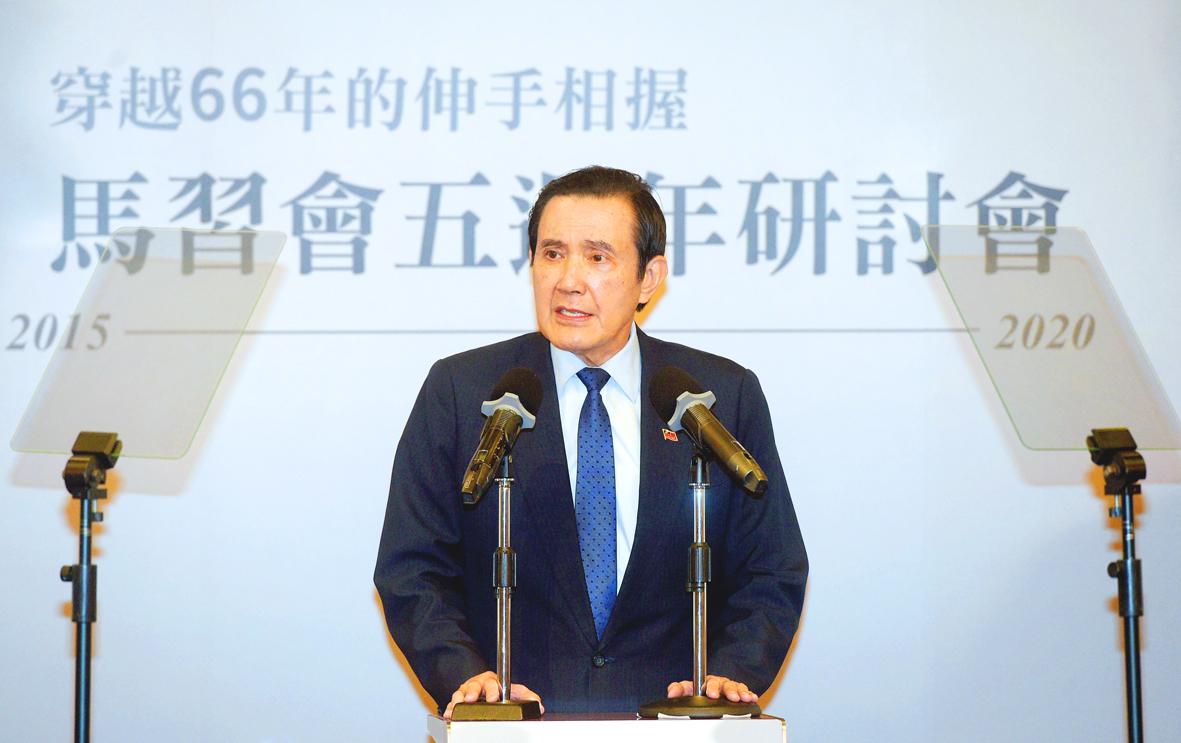President Tsai Ing-wen (蔡英文) has undermined Ma Ying-jeou’s (馬英九) peace efforts with China, the former president said yesterday, adding that Tsai could meet with Chinese President Xi Jinping (習近平), provided she agreed to the so-called “1992 consensus.”
Ma made the remarks at a forum hosted by the Ma Ying-jeou Foundation in Taipei, marking the fifth anniversary of his meeting with Xi in Singapore on Nov. 7, 2015, the first time that leaders from both sides of the Taiwan Strait had met since 1949.
“It was for building a ‘bridge for peace’ for dialogue between the two sides of the Strait,” Ma said of the meeting.

Photo: Chang Chia-ming, Taipei Times
“The summit was not an accident, but was the result of our accumulated efforts over seven years to establish a common political foundation and build mutual trust,” he said. “Mr Xi and I exerted great effort to remove many obstacles to meet at the time, and we did so to advance the cause of peace across the Strait, and this would not be forgotten by history.”
By not accepting the “1992 consensus,” the Democratic Progressive Party government has destroyed that trust and political foundation, Ma said.
“Therefore the ‘bridge for peace’ was closed down,” he said, adding that Tsai had distorted the meaning of the “consensus” to mislead people to believe it was equivalent to the “one country, two systems” framework.
The “1992 consensus,” a term former Mainland Affairs Council chairman Su Chi (蘇起) in 2006 admitted making up in 2000, refers to a tacit understanding between the Chinese Nationalist Party (KMT) and the Chinese government that both sides of the Strait acknowledge there is “one China,” with each side having its own interpretation of what “China” means.
Citing Tsai’s Double Ten National Day address last month, in which she said that Taiwan would not fear war nor would it seek it, Ma said: “We must be prepared for war, while making moves to avoid war, while seeking peace, thereby creating an advantageous situation for our side. War is not the way to solve problems.”
Ma said that for Tsai and Xi to meet, she must create a political foundation by agreeing to the “1992 consensus.”
“I hope that both sides can return to the original concept of the ‘1992 consensus,’ which would enable a meeting. I was the one who built up this ‘bridge for peace,’ in the hopes of guiding future leaders on both sides of the Taiwan Strait to walk along the ‘boulevard of peace,’” Ma said.
“I implore Tsai, if she cannot present an alternative policy, then she should accept the ‘1992 consensus,’ which can lead to negotiations for peace with China, and Taiwanese can live in peace,” he said.
In his address, Ma also called on China to stop military provocations against Taiwan with Chinese military aircraft incursions.
“Such moves will lead to more animosity from Taiwan, so I urge China to immediately stop such harassment,” he said. “I believe both China and the Tsai government should focus on reducing this tense situation across the Strait, and to take up concrete measures toward this goal.”

Taiwanese scientists have engineered plants that can capture about 50 percent more carbon dioxide and produce more than twice as many seeds as unmodified plants, a breakthrough they hope could one day help mitigate global warming and grow more food staples such as rice. If applied to major food crops, the new system could cut carbon emissions and raise yields “without additional equipment or labor costs,” Academia Sinica researcher and lead author the study Lu Kuan-jen (呂冠箴) said. Academia Sinica president James Liao (廖俊智) said that as humans emit 9.6 billion tonnes of carbon dioxide compared with the 220 billion tonnes absorbed

The Taipei Mass Rapid Transit (MRT) Wanda-Zhonghe Line is 81.7 percent complete, with public opening targeted for the end of 2027, New Taipei City Mayor Hou You-yi (侯友宜) said today. Surrounding roads are to be open to the public by the end of next year, Hou said during an inspection of construction progress. The 9.5km line, featuring nine underground stations and one depot, is expected to connect Chiang Kai-shek Memorial Hall Station to Chukuang Station in New Taipei City’s Jhonghe District (中和). All 18 tunnels for the line are complete, while the main structures of the stations and depot are mostly finished, he

Taipei is to implement widespread road closures around Taipei 101 on Friday to make way for large crowds during the Double Ten National Day celebration, the Taipei Department of Transportation said. A four-minute fireworks display is to be launched from the skyscraper, along with a performance by 500 drones flying in formation above the nearby Nanshan A21 site, starting at 10pm. Vehicle restrictions would occur in phases, they said. From 5pm to 9pm, inner lanes of Songshou Road between Taipei City Hall and Taipei 101 are to be closed, with only the outer lanes remaining open. Between 9pm and 9:40pm, the section is

China’s plan to deploy a new hypersonic ballistic missile at a Chinese People’s Liberation Army Rocket Force (PLARF) base near Taiwan likely targets US airbases and ships in the western Pacific, but it would also present new threats to Taiwan, defense experts said. The New York Times — citing a US Department of Defense report from last year on China’s military power — on Monday reported in an article titled “The missiles threatening Taiwan” that China has stockpiled 3,500 missiles, 1.5 times more than four years earlier. Although it is unclear how many of those missiles were targeting Taiwan, the newspaper reported